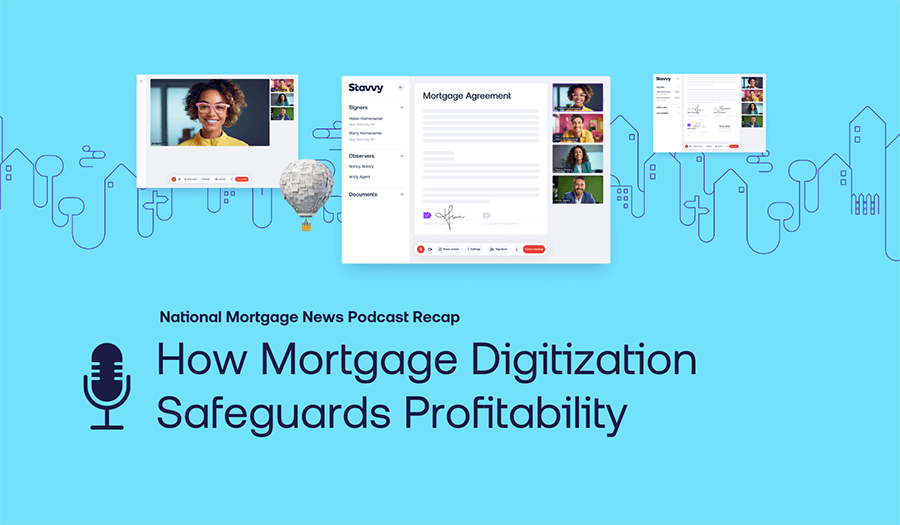As we step into a new year following the implementation of Illinois Senate Bill 2664 effective on January 1, 2024, the landscape of notarization processes, especially in the real estate sector, has undergone a transformative change. This pivotal legislation sets a new standard in the Illinois market, and for real estate companies operating within the state, leveraging electronic notarization is now essential. In this blog, we explore the benefits and applications of eClosing with remote online notarization (RON) and in-person electronic notarization (IPEN). Use it as a reference to stay informed and ensure your business is aligned with the latest developments in Illinois's real estate notarization practices.
Legalization of Illinois remote online notarization
In July 2021, Governor Pritzker signed Public Act 102-0160, amending the Illinois Notary Public Act. This act permanently allows electronic notarial acts. On June 5, 2023, the Illinois Secretary of State’s Office (IL SOS) adopted administrative rules that make the Act effective on January 1, 2024, and provide the necessary guidance for Illinois notaries who wish to perform electronic and remote notarial acts.
eClosing with RON and IPEN
Electronic notarization, particularly through a platform like Stavvy, is revolutionizing the real estate closing process by offering a blend of remote online notarization (RON) and in-person electronic notarization (IPEN) providing the flexibility to choose the most suitable eClosing method for each transaction. This combination significantly enhances the closing experience by integrating digital solutions that can save time, reduce costs, and add flexibility.
With RON, notaries, title agents, customers, attorneys, and other participants can enjoy the convenience of signing and notarizing documents from any location with internet access, eliminating the need to reorganize schedules for in-person signings. This flexibility extends to all parties involved, improving support, communication, and overall customer experience. RON also bolsters security against real estate fraud through rigorous identity verification methods and with an accompanying digital audit trail. The digitization of the closing process can not only shorten closing times but also streamline the workflow.
On the other hand, IPEN offers an in-person digital experience where the participants meet physically but conduct the signing digitally, using portable devices like tablets. This approach maintains the familiarity of traditional closings while integrating the efficiency of digital processes. With IPEN, participants can expect a paperless experience that retains the personal touch of conventional closings, while significantly reducing the time and money spent on each transaction. The reduced need for printing and preparing documents, combined with the lower risk of missing documents or signatures, minimizes errors and post-closing remediation. This ensures a fast, efficient, and secure signing workflow, enhancing the overall experience for signers and notaries.
Key requirements for remote online notary in Illinois
Before engaging in electronic notarization in Illinois, notaries are required to fulfill specific state prerequisites. Beginning January 1, 2024, each candidate seeking a notary public commission must successfully complete an educational course, pass a qualifying examination, secure a notary bond, and submit a completed application to the Illinois Secretary of State.
Coursework: Every notary must complete a 3-hour course of study before submitting their application. The IL SOS has posted a list of approved course providers on its website. The course must conclude with a 50-question final exam. Notaries must pass the exam with a score of 85% or higher. If a notary fails the exam 3 times, the course must be retaken.
Bond: In addition to the course and exam, every notary public applicant must obtain a bond. Notary publics performing remote or electronic notarizations are required to have a $30,000 bond.
Application: Once the notary applicant has passed the test and obtained a bond, the applicant must complete and submit an application to the IL SOS. The application can be found on the IL SOS website. Electronic notaries must name the IL SOS-approved electronic notary platform they will use to perform notarizations upon being commissioned. Stavvy has received the necessary approval and is listed as an approved technology vendor.
Get your organization ready for eClosing
Transitioning to eClosing is a significant move for any organization. The key to a successful transition lies in thorough preparation and strategic implementation.
Educating your team: The first step is to educate your team about the concept and benefits of eClosing. It's crucial to address any hesitations and provide comprehensive training. Utilizing resources and insights from platforms like Stavvy can be instrumental in this phase.
Choosing the right technology provider: Choosing the right technology provider is crucial, and Stavvy distinguishes itself as a superior choice with its comprehensive digital platform. With its intuitive user interface and robust eClosing features, Stavvy emerges as an ideal partner. It excels in facilitating notary onboarding and offers extensive training and support, ensuring a seamless transition.
Updating business processes: Updating your business processes to align with digital closing procedures is another important step. This includes adapting your workflow to accommodate eClosing and ensuring compliance with relevant laws and regulations.
Informing partners: Lastly, keep your partners, such as mortgage lenders and real estate agents, informed about the shift towards eClosing. Demonstrating the benefits and efficiencies of eClosing can help in building stronger, more collaborative relationships in the industry.
By focusing on these areas, your organization can effectively navigate the shift to eClosing, setting a foundation for improved efficiency, accuracy, and client satisfaction in the digital age.
Learn more about how the Stavvy Platform is taking real estate beyond documents.



![[Webinar Recap] Advancing Your Digital Default Servicing Strategy](https://blog.stavvy.com/hubfs/advancing-your-digital-default-servicing-strategy-blog-recap.png)